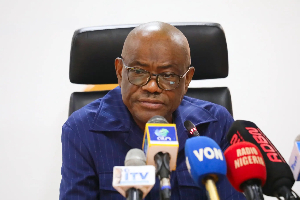The Federal Government through the Minister of Solid Minerals Development, Dr Oladele Alake, has said that state governments have no power to regulate mining activities.
He also said the ban by states on mining was illegal and not in line with the constitution.
The minister said this during a pre-event press conference in Abuja for the 8th edition of the annual Nigerian Mining Week 2023 from Monday to Wednesday.
He said, “The states’ ban on mining activities across the country is a point that is really sore. And it’s a constitutional matter. I want to use this opportunity to get to the entire Nigerian public that no state and I repeat, no state has the authority to interfere in mining operations, no state has the authority, and it is not it’s a no-brainer. It’s a constitutional matter.
“Mining belongs exclusively in the purview of the Federal Government, according to the Constitution. It is in the exclusive legislative list. It is not in the residual. It is not in the concurrent; it’s in the exclusive legislative list. Every item on the exclusive legislative list belongs to the Federal Government. There is no doubt about that. All items on the residual list belong to the states and all items in a concurrent section belong to both, but mining, like oil, and solid minerals belongs in the exclusive legislative, therefore, it is the Federal Government that has the authority; legal authorities as supported by the constitution to make laws regulations and operationalization of the solid minerals resources of Nigeria.”
The minister added that if states need to engage in mining activities, they should go through the right process and apply for a licence.
He said, “Mind you we are not against any state that wants to engage a mining operation as long as it follows the due process. If any state wants to engage in mining, it can form its own special purpose vehicle, apply for a mining licence from the office of the minister for solid minerals and go through the due process, and be so licensed if it meets all the criteria.
“But for a state to wake up and say it is regulating mining activities is like a state waking up to ban oil exploration. It is downright illegal.”
However, he said that the Federal Government did not intend to confront states but to engage and educate them on what is the right thing to do.
He added that he had met with the chairman of the Nigeria Governors’ Forum and some state governors in addressing the issue.
Checks by The PUNCH showed that states including; Kebbi, Zamfara, Taraba, Osun placed recently banned mining.
States defend ban
Kebbi State Government has explained the reasons behind the recent ban placed on illegal mining activities in the state.
The Chief Press Secretary to the state governor, Ahmed Idris, while speaking with our correspondent on the telephone said the state government banned it in order to regulate the activities.
He said, “We ban the activities temporarily so as to regulate it. We want to have accurate data on what is happening there.
“We also believe it will help the government in improving its revenue as more people will pay their tax through it.”
He, however, explained that the ban was for a temporary period of time.
Zamfara state government said it banned illegal mining because of the insecurity challenges affecting the state.
The Commissioner of Information Munnir Haidara who spoke to The PUNCH through the Director of Information of the ministry said, the state government was quite aware that it was not within its powers to ban mining activities.
security situation improved.
The PUNCH earlier reported in September that the Minister of Solid Minerals Development, Dele Alake, gave all miners engaged in the illegal extraction of mineral resources in the country an ultimatum of 30 days to join notable mining cooperatives or face the full wrath of the law.
This was even as the minister unveiled a plan to set up a surveillance task force that would include policemen and other relevant agencies to secure the mines in the country.
Responding to a question on the progress made after the end of his ultimatum, the minister said that the deadline had been extended for another 30 days.
“Because of the pragmatism involved off the field, we have also decided to extend that ultimatum by another 30 days,” Alake said.
He noted that a number of miners had been coming to register but did not specify the number.
The minister added that this move was not punitive but to help such miners have a structure and a legitimate business.
“That ultimatum was not to punish anybody. It was given to help them, formalize them, bring them on board so that government can engage them and they can become real, bankable investments.”
The minister also warned that any mining company that breaches community development agreements or fails to comply with necessary regulations may lose their licences.
The PUNCH earlier reported that about 82 mining companies failed to make the mandatory social payments to host communities, according to the Nigeria Extractive Industries Transparency Initiative.
This was disclosed in the NEITI Industry report for the Solid Minerals Industry for 2021, which was recently launched.
The report disclosed that out of 121 companies, only 39 made the mandatory social payments in line with the community development agreement.
It read, “The report observed that only 39 out of 121 companies made the mandatory social payments as contained in the CDA signed with their host communities, while 10 companies made only non-mandatory social payments/expenditures.
“This reveals poor compliance to the social benefit to host communities’ requirements of the NMMA 2007 and NMMR 2011 as embedded in the CDA’s.”
It was also disclosed that many mining companies did not comply with environmental standards during their operations.
‘The report found that only 50 out of 121 companies (41.32 percent) fully complied with environmental standards, indicating low overall compliance with environmental laws and regulations by most companies,” the report added.
NEITI advised the Ministry of Solid Minerals and Mining Cadastre Office to work on a framework to monitor compliance with the terms of the Mineral and Mining Act 2007 and the Minerals and Mining Regulations, 2011.
It also advised penalties for non-compliance and appropriate implementation of such penalties.
Business News of Thursday, 12 October 2023
Source: www.punchng.com













